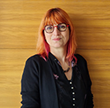ENCORE+. Interview with Deborah Arnold

The ENCORE+ project supports the uptake and innovation of Open Educational Resources (OER) for education and business. An improved understanding and strategy for enabling people to receive credentials for their learning with OERs has been identified as a key enabler for uptake. With this in mind, UNIR iTED team has conducted a series of in-depth interviews to explore innovative approaches to credentialising learning in the European OER ecosystem, the opportunities which they offer, and the barriers to their application. The interviews also contributed to an ENCORE+ report discussing the same topic.
Interview #7: Deborah Arnold
Deborah Arnold has been involved in digital education in Europe for over 20 years, as project manager, teacher and more recently researcher. In her current role at AUNEGe – the French digital university for management and economics – she works with members to support academics in OER production for the Université Numérique repository and recently coordinated the Erasmus+ project ECCOE (European Credit Clearinghouse for Opening up Education), focusing on digital micro-credentials.
In the interview Deborah discusses the infrastructure that has been developed in Europe for the description and authentication of alternative credentials. She argues for the importance of associating clearly defined learning objectives with OERs, which facilitate the design of assessment, and make MOOCs and micro-credentials more findable and relevant to learners. She also stresses the value of collaboration with stakeholders in the community and business in the articulation of requirements and necessary skills.
The interview is published here.
